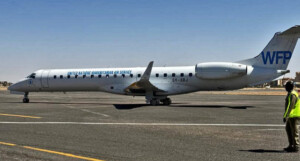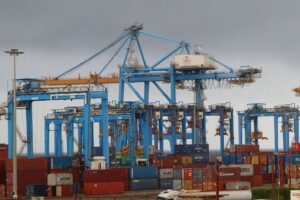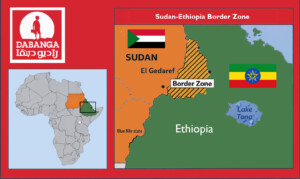‘Downsizing Unamid not an option amid ongoing attacks in Darfur’: Amnesty
Satellite images show the destruction of villages during the armed conflict and attacks in Jebel Marra between March and May 2018. The photos are released ahead of a critical vote at the UN Security Council that will consider the downsizing of the joint African Union-United Nations mission in Darfur (Unamid).
 Attacks on Darfuri people by government forces and allied militias has displaced thousands of people from their homes camps and caves in the area of Jebel Marra in the first six months of 2018 (Amnesty International)
Attacks on Darfuri people by government forces and allied militias has displaced thousands of people from their homes camps and caves in the area of Jebel Marra in the first six months of 2018 (Amnesty International)
Satellite images show the destruction of villages during the armed conflict and attacks in Jebel Marra between March and May 2018. The photos are released ahead of a critical vote at the UN Security Council that will consider the downsizing of the joint African Union-United Nations mission in Darfur (Unamid).
Amnesty International has obtained the satellite and photo images showing extensive damage caused by ongoing attacks on villages in the region and released them today.
Between March and May 2018, government forces and pro-government militias, especially the Rapid Support Forces (RSF), attacked and burned villages in south-east Jebel Marra during military operations against the Sudan Liberation Army led by Abdelwahid El Nur (SLA-AW). Between 12,000 and 20,000 people have been displaced as a result of these attacks and are living in caves in the Jebel Marra massive without access to humanitarian assistance.

burned(AI)
The satellite images show at least 18 villages in the eastern parts of the Jebel Marra area of Darfur were burnt by government and allied militia forces over the past three months. These images corroborate witness accounts collected by Amnesty International and earlier reports by Radio Dabanga, from at least 13 affected villages.
Amnesty International interviewed eye-witnesses of attacks on Feina, Korgo Duma, Balley, and Sabun Alfugur. Also Radio Dabanga interviewed people in Feina, which came under attack of paramilitary forces several times in March. [video]

“The Sudanese government has clearly failed to protect its own citizens, and this must not be allowed to continue.” – Joan Nyanyuki (AI)
Joan Nyanyuki, Amnesty International’s Director for East Africa, the Horn and the Great Lakes: “The UN Security Council must not and cannot abandon the people of Darfur by downsizing Unamid, their only source of security and safety. For hundreds of thousands of displaced Darfuris, the ongoing looting and burning of their homes makes the prospect of returning to their villages unthinkable.”
Displaced under siege
In the public statement today, Amnesty International called for a strong mandate for Unamid to protect civilians, including with a capacity to monitor and publicly report on human rights situation in Darfur. The human rights watchdog added that there have been attacks on displaced people in Darfur since August 2017.
‘Kalma camp, one the largest camps in South Darfur, situated about 15 km east of Nyala the capital of South Darfur state, was attacked in September 2017, five killed and 33 injured, during a protest against the visit of President Omar Al Bashir to South Darfur.
‘[In January 2018] Hasahisa camp in Zalingei was attacked by RSF and one person was killed and five were injured.
‘On 21 May, five members of the RSF on board a pick-up truck mounted with machine-guns attacked Khamsa Degaig camp in Central Darfur’s city of Zalingei using live ammunition. A 22-year-old woman was shot in the head and later died at the hospital.’
In addition, Amnesty International states that the provision of safety to displaced people returning to their areas of origin in Darfur after years of living in the camps, has been a failure. ‘Many displaced people and refugees faced pushback and violence as they attempted to settle back in their lands of origin.
‘For example, in North Darfur, according to the United Nations Office for the Coordination of Humanitarian Affairs (OCHA), the voluntary repatriation of Sudanese refugees from Chad started in March, and 20,000 refugees are anticipated to return to their places of origin in Darfur in 2018… However, [Radio Dabanga reported that] approximately 250 displaced families were forced to settle in an IDP camp in Kabkabiya in North Darfur, as new settlers in their land of origin refused them access to their land.
‘In March, about 400 people, mainly from Zaghawa ethnic group, from El Neem camp in East Darfur, attempted to return to their village of origin, Alareid, about 37 km north of El Daein. Upon arrival, they found their village occupied by new settlers who attacked them, resulting in serious injury of two. The displaced people were forced to return back to El Daien camp where they have been displaced since 2007.’
Downsizing
Nyanyuki of Amnesty International: “The Sudanese government has clearly failed to protect its own citizens, and this must not be allowed to continue. On its part, the UN Security Council must continue the mandate of Unamid to protect and safeguard the lives and human rights of the people of Darfur.”
Earlier this month, the Peace and Security Council (PSC) of the African Union (AU) has decided to extend the mandate the hybrid peacekeeping mission for 12 months. In a year time, the mission has been sized down by more than a third of the nearly 19,000 Unamid military troops and police officers it had in June 2017.
Darfur displaced, Sudanese politicians, and international activists have all warned for the consequences of a downsizing of the number of peacekeepers for the people in Darfur.











 and then
and then